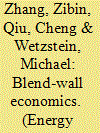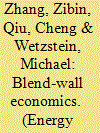| Srl | Item |
| 1 |
ID:
096709


|
|
|
|
|
| Publication |
2010.
|
| Summary/Abstract |
The US Environmental Protection Agency is currently considering a waiver allowing an increase in the fuel-ethanol blend limit (the "blend wall") from 10% (E10) up to 15% (E15). Justifications for this waiver are reduced vehicle fuel prices and less consumption of petroleum gasoline leading to energy security. A theoretical examination of this waiver reveals an anomaly where a relaxation of this blend wall elicits a demand response. Under a wide range of elasticities, this demand response can actually increase the consumption of petroleum gasoline and thus lead to greater energy insecurity. The economics supporting this result and associated policy implications are developed and discussed.
|
|
|
|
|
|
|
|
|
|
|
|
|
|
|
|
| 2 |
ID:
097496


|
|
|
|
|
| Publication |
2010.
|
| Summary/Abstract |
The US Environmental Protection Agency is currently considering a waiver allowing an increase in the fuel-ethanol blend limit (the "blend wall") from 10% (E10) up to 15% (E15). Justifications for this waiver are reduced vehicle fuel prices and less consumption of petroleum gasoline leading to energy security. A theoretical examination of this waiver reveals an anomaly where a relaxation of this blend wall elicits a demand response. Under a wide range of elasticities, this demand response can actually increase the consumption of petroleum gasoline and thus lead to greater energy insecurity. The economics supporting this result and associated policy implications are developed and discussed.
|
|
|
|
|
|
|
|
|
|
|
|
|
|
|
|
| 3 |
ID:
093519


|
|
|
|
|
| Publication |
2010.
|
| Summary/Abstract |
Sorting out the impacts of biofuels on global agricultural commodity prices is impossible without turning to data and distinguishing between the short-run versus the long-run impacts. Using time-series prices on fuels and agricultural commodities, the aim is to investigate the long-run cointegration of these prices simultaneously with their multivariate short-run interactions. Results indicate no direct long-run price relations between fuel and agricultural commodity prices, and limited if any direct short-run relationships. In terms of short-run price movements, sugar prices are influencing all the other agricultural commodity prices except rice. With sugar the number one world input for ethanol, results indicate increased ethanol production is potentially influencing short-run agricultural commodity prices. Overall, results support the effect of agricultural commodity prices as market signals which restore commodity markets to their equilibria after a demand or supply event (shock).
|
|
|
|
|
|
|
|
|
|
|
|
|
|
|
|
| 4 |
ID:
176114


|
|
|
|
|
| Summary/Abstract |
Sulfur dioxide (SO2) emissions from coal-fired power plants in China have declined significantly since an incentive-based policy named as the desulfurated electricity pricing premium program (DEPPP) was implemented for all coal-fired power plants in 2006. Using industrial pollution panel data from 350 prefectures in China and difference-in-differences models, we estimate causal effects of the DEPPP on the coal-fired power plants. We find that the DEPPP provided the coal-fired power plants strong incentives to invest in capital-intensive flue gas desulfurization (FGD) equipment and to operate the installed FGD at a higher rate, and thus contributed to significant reductions in total SO2 emissions in China. Our results suggest that the DEPPP reduced uncertainty faced by the coal-fired power plants when making large capital investments in SO2 abatement techniques such as FGD to comply with stringent environmental regulations. However, the DEPPP may not be cost-effective in reducing SO2 emissions given heterogeneous marginal costs for operating FGD units in different coal-fired power plants. Furthermore, the effectiveness of the DEPPP also depends on strengthened environmental regulatory capacities to enforce coal-fired power plants to comply with the operating rate requirement for the installed FGD.
|
|
|
|
|
|
|
|
|
|
|
|
|
|
|
|